EV charging station contractors play a crucial role in modernizing transportation infrastructure, meeting the rising demand for electric vehicles. They offer comprehensive services from consultation and surveys to warranty and maintenance of charging systems.
Role of Charging Station Contractors
Contractors for EV charging stations are pivotal in upgrading transport infrastructure to accommodate electric vehicle growth. They provide end-to-end services, including consultation, site surveys, design, installation, and maintenance at locations like office buildings, residential complexes, shopping centers, fueling stations, hospitals, and schools. Their presence optimizes land efficiency, supports sustainable development, and fosters green growth.
Design and Site Survey
Charging station contractors are the first to conduct site assessments, identifying optimal locations for installations based on terrain and environmental factors. Following this, they design the comprehensive system layout, from the arrangement of chargers to the necessary technical infrastructure.
- Site survey: Terrain, environment, technical analysis.
- System design: Charging station layout planning.
Site Preparation
Before construction, contractors ensure the site is prepared adequately, responsible for site clearance and material supply.
- Site clearance: Leveling and cleaning the area.
- Material supply: Ensuring availability for construction.
Infrastructure Construction
Building infrastructure encompasses setting strong foundations and efficient drainage systems. The installation of electrical systems includes components from renowned brands like ABB and Schneider to ensure quality and safety.
- Electrical systems: Transformers, electrical connections.
- Foundation construction: Robust drainage system.
Equipment Installation
Installing the charging systems is crucial for optimal performance and safety. Only high-quality equipment from trusted brands is chosen to meet stringent technical standards.
- High-quality equipment: ABB, Mitsubishi, Schneider brands.
- Charger installation: Effective management systems.
Maintenance and Upkeep
Regular maintenance of charging stations is essential for smooth operations and safety, adhering to fire prevention and safety regulations.
- Continuous operation assurance: Routine maintenance.
- Safety compliance: Fire prevention standards.
Partnership and Support
Collaborating closely with site owners and ensuring uninterrupted operation of current facilities is vital for installation success.
- Partner collaboration: Ensuring no interference with parking areas.
- Partner support: Operational assistance.
Ensuring Technical Standards
Contractors conduct rigorous checks to meet international safety and technical standards, emphasizing sustainable development.
- Meeting international standards: Technical and safety compliance.
- Testing and trials: Ensuring efficient operation.
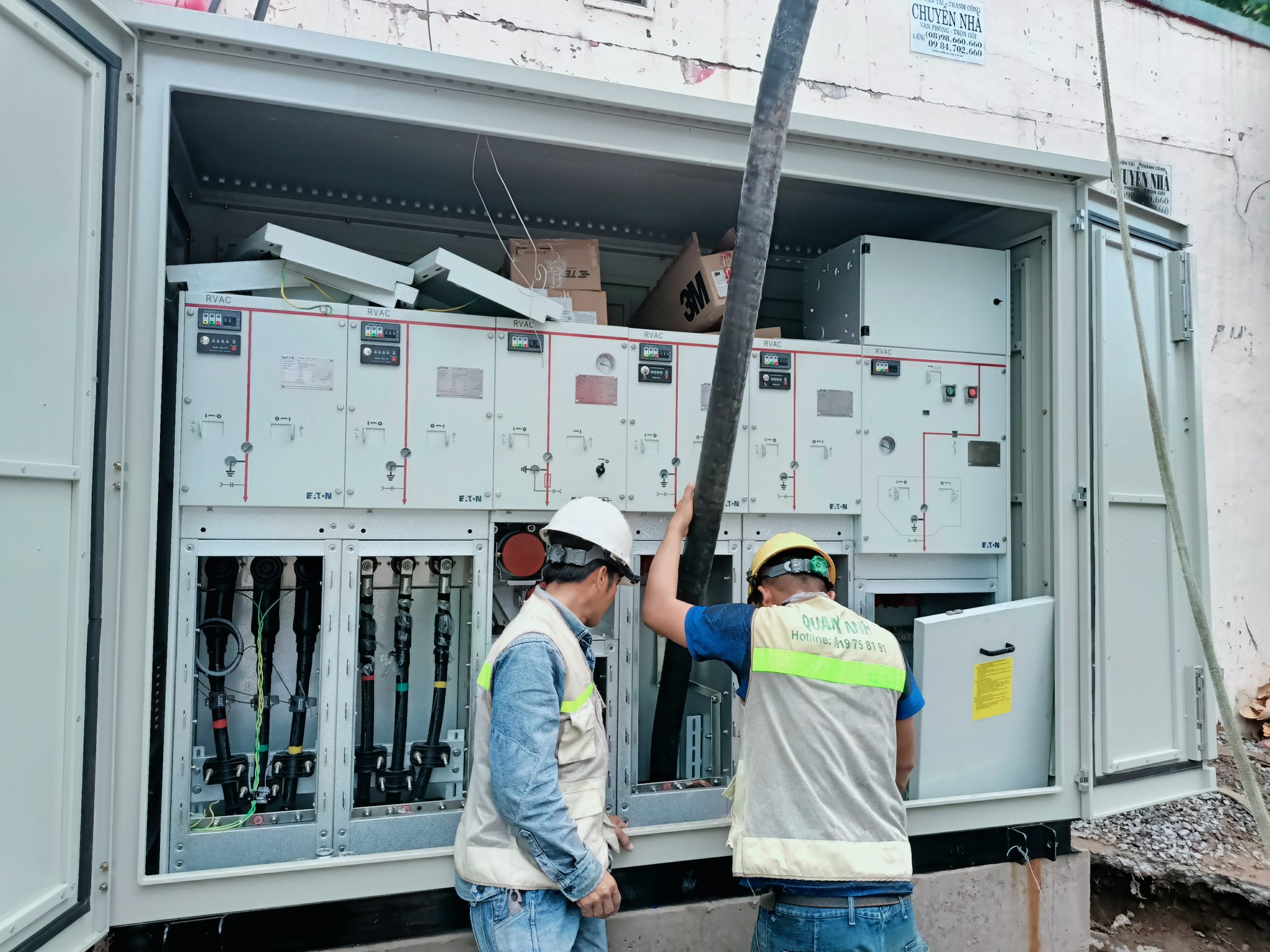
Service Quality and Safety Standards
EV charging station contractors in Vietnam are committed to providing services that meet safety standards, utilizing equipment from global brands such as Schneider, ABB, Bosch, and Siemens. Their goal is to ensure the highest quality, durability, and safety throughout the service lifecycle. Besides, they offer extensive warranties, free surveys, routine maintenance, and optimized solutions for each project, preserving investment value and enhancing customer experience.
The quality of charging station contractor services is crucial for businesses and contractors alike. In Vietnam, this compliance is strictly regulated by national and technical standards from government agencies.
-
Intelligent charging management: Modern stations integrate smart management technology allowing for remote monitoring and control. This elevates service quality and enhances contractor responses to incidents and preventive maintenance, ensuring non-stop service.
-
Safety standards for charging stations: Compliance with mandatory safety standards is crucial to protecting people, assets, and the environment. Standards such as TCVN 13078-1:2020 and TCVN 13078-25:2023 cover technical aspects of EV charging, from electrical safety to explosion protection and external agent defense.
International standards like ISO 15118 and IEC 62196 are equally important, providing a basis for secure vehicle-to-station connectivity through ‘Charging Connection Standards.’ These regulations collectively deliver a safe and effective user experience.
- Charging station maintenance service: A key component of service quality is the scheduled maintenance plan. Contractors should regularly conduct inspections and maintenance to ensure peak system performance. For service providers, comprehensive workforce training is necessary to guarantee staff are equipped with adequate skills and knowledge in operations and incident management.
Throughout operation, Electrical Protection Standards are strictly applied to safeguard against electrical failures like overloads or short circuits, thereby ensuring absolute safety for users and vehicles.
These factors contribute to the reliability of charging station contractor service quality, strengthening customer trust and preserving the investment value for businesses.
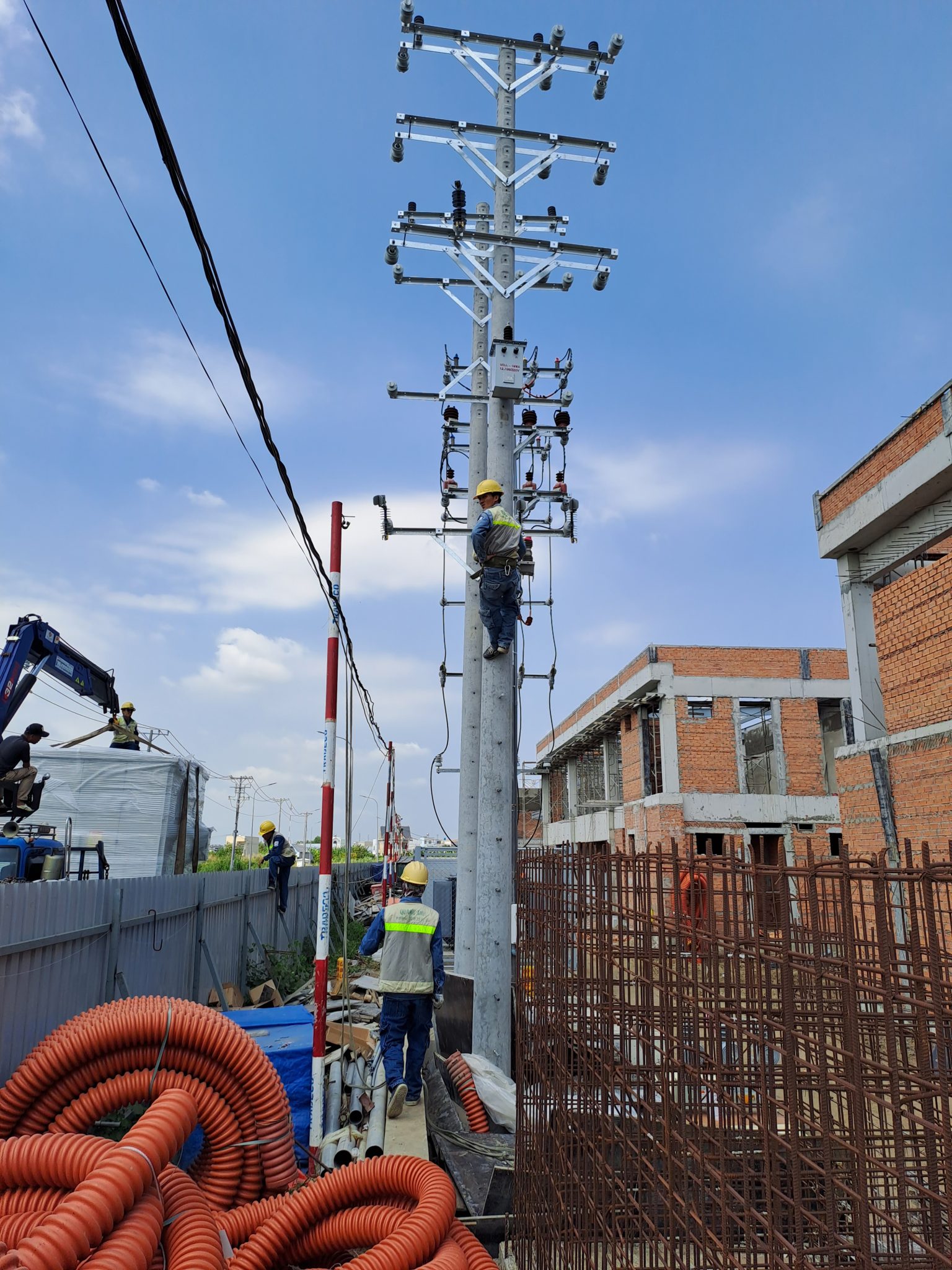
Installation Process of EV Charging Stations
The installation process for EV charging stations in Vietnam usually involves key steps: Field surveys where contractors assess the terrain, power supply, and station placement. This is followed by system design, which involves developing the most efficient and aesthetically pleasing and safe technical solution. During construction, charging stations are installed and tested under set standards to ensure quality before official use. Finally, contractors provide warranty and maintenance services, addressing issues and scheduling regular maintenance to ensure sustainable operation.
The installation process of EV Charging Stations is deployed through specific steps to achieve maximum efficiency and safety for both the system and users.
Evaluating Demand and Requirements
-
Determining demand: Users of EV charging stations have diverse needs for electric vehicles. Accurate identification of the expected number and types of vehicles helps shape the energy demand and scale.
-
Location assessment: Finding the optimal location is crucial for convenience and safety. The site should be easily accessible for all EVs with quick connectivity to the power infrastructure.
Evaluating Electrical Infrastructure
-
Electrical system inspection: This step involves assessing the current power system capacity where the charging station is planned to avoid overload or energy shortage issues.
-
Power analysis: Determine the necessary charging station capacity and check the system’s ability to support it. This ensures optimal operation without affecting other activities.
Charging Station System Design
-
Choosing charging equipment: Decide on the type of charging interface, AC or DC, and select reputable brand equipment like ABB, Schneider, influencing station performance and longevity.
-
Creating a connection model: Designing the network configuration and power allocation for charging units is crucial for optimizing efficiency and stability.
Construction and Installation
-
Execute according to design: Implement construction per established technical designs and standards ensuring accuracy and feasibility in every phase.
-
Testing and trial runs: Post-installation, conduct full system tests to verify stability and safety before full operation.
Maintenance and Operations
-
Scheduled maintenance: Perform regular maintenance activities to ensure EV charging stations function optimally and prevent unwanted breakdowns.
-
Operation and monitoring: Closely track station operations to quickly detect and address any abnormalities. Monitoring boosts system reliability over the long term.
Regulations and Standards
-
Regulatory compliance: Strict adherence to all fire and environmental safety regulations is essential to secure both the system and users and the surrounding environment.
-
Technical standards: Implement advanced technical standards to guarantee quality beyond safety, enhancing operational performance.
Fire Safety
- Power disconnection: Both automatic and manual power disconnection devices must be installed to protect the system against unforeseen incidents.
The entire installation process of EV Charging Stations demands in-depth technical expertise and meticulous attention at each stage to optimize safety and operational performance.
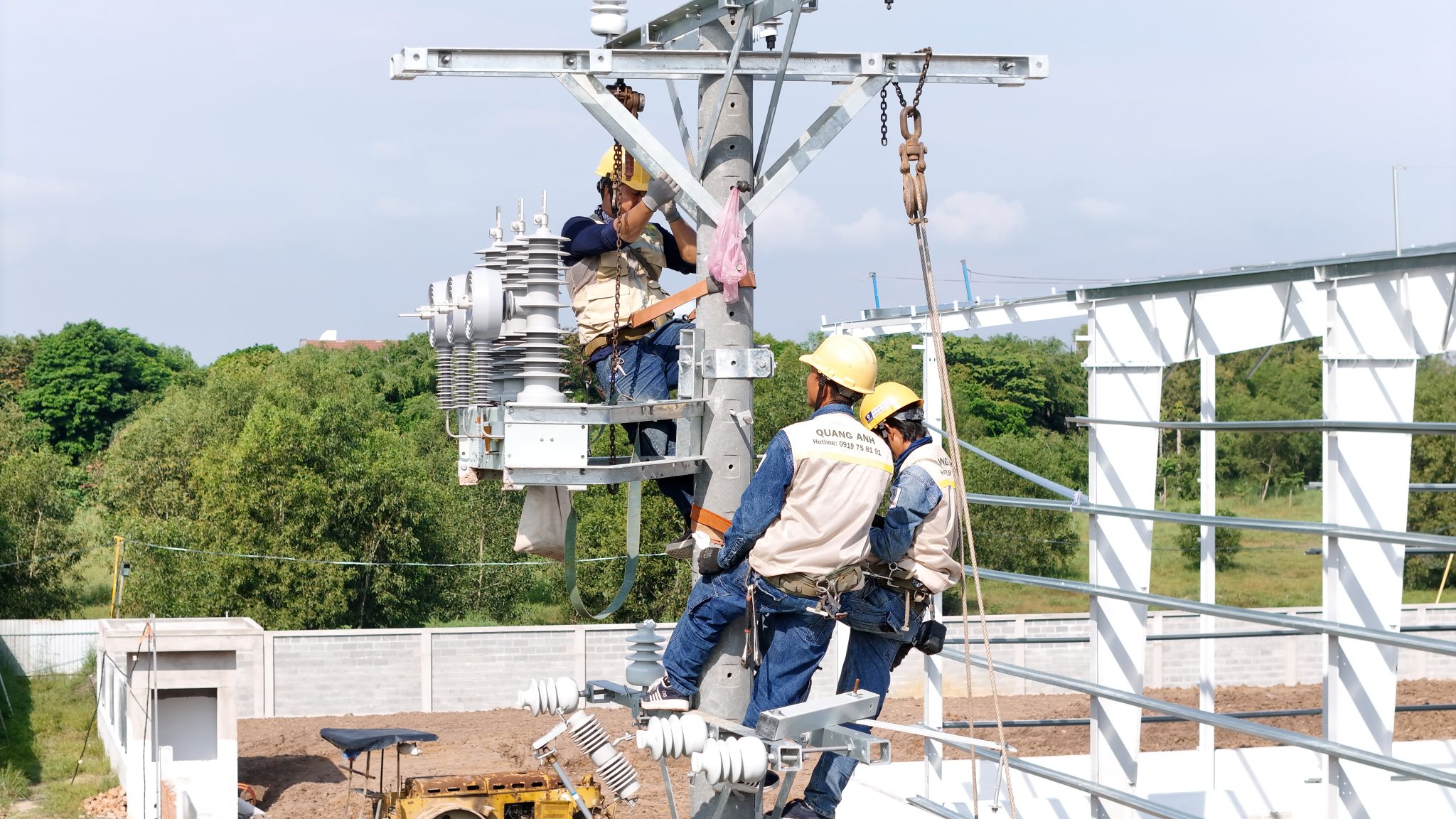
Technology Trends in Charging Solutions
Technology Trends and Investment Strategies in Charging Solutions
The current technology trend shows many contractors offering ‘zero-cost’ investment solutions to property owners, meaning they cover all investment and installation costs, later sharing revenue with the property owner. This fosters the nationwide network expansion of charging stations. Fast charging technology, smart charging, and integrated remote management systems are also being actively implemented by contractors. These solutions not only provide economic benefits but also promote sustainable transport infrastructure development within cities.
In the context of electric vehicle development, charging stations now play a key role in clean energy transport infrastructure. In Vietnam, high-capacity, multi-port charging stations are becoming more common, with companies like VinFast deploying chargers up to 360 kW, allowing multiple vehicles to use them simultaneously, optimizing space, and reducing wait times. The rapidly developing EV charging market creates opportunities for charging station investment expansion.
- Enhancing capacity and number of charging ports: With over 150,000 ports expected by 2025, Vietnam leads with public charging port density. Energy technology partners like Schneider and ABB have integrated many solutions optimizing capacity and distributing diverse charging ports, meeting users’ fast charging needs.
- Applying digital technology and big data: Big Data technology helps adjust smart charging station location and operational capacity, enhancing efficiency and improving user experience.
- Payment solutions and utilities: Charging systems integrated with Plug & Charge technology allow automatic and quick payments without multiple procedures. Simultaneously, mobile applications are being developed robustly to offer a one-stop charging management experience, optimized for users.
- Facility and energy storage systems: Many stations have been upgraded with protective canopies, creating comfortable spaces while charging. Applying energy storage solutions helps stabilize supply and supports stations in avoiding overload situations, maintaining stable operations.
On the investment side, strategies for developing a charging station network must be diverse and flexible to achieve maximum efficiency. Notable solutions include:
- Comprehensive and large-scale investments: Developing the charging station system must be systematically organized and focus on key areas like cities and highways to ensure convenience for EV users. Government collaboration with international companies, such as Eaton and LS, will yield positive results.
- Franchise charging station systems: This model allows for swift and flexible deployment, network expansion with optimal costs, serving various vehicle types and increasing user accessibility.
- Policy support and financial incentives: Government support policies, tax incentives, and technological investments are crucial factors improving charging infrastructure and promoting sustainable development.
- Smart technology application: Centralized management software helps optimize capacity, forecast charging demand, and enhance user experience through smart charging management systems.
With the continuous development of technology trends and investment models, EV charging systems in Vietnam promise to keep expanding, catering to the demand for sustainable and clean mobility in the future.
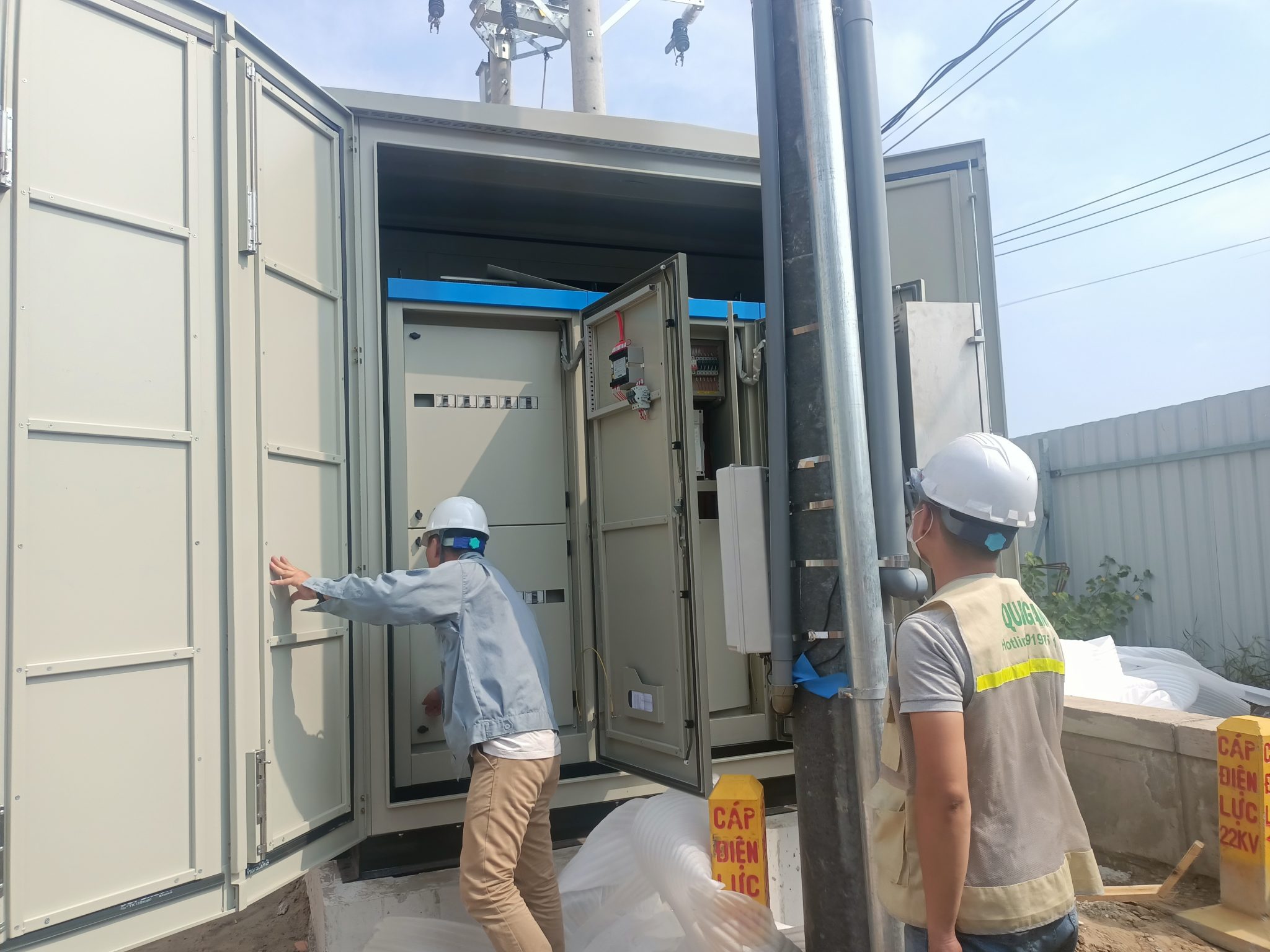
Charging station contractors are proving essential in building infrastructure for electric vehicles, providing high-quality services, ensuring safety, and adopting cutting-edge technology. Their flexible investment solutions, like ‘zero-cost’ investments and smart charging tech, support technological and economic advantages while meeting the dynamic needs for sustainable urban transport growth.
To leverage modern charging station solutions, contact QuangAnhcons at +84 9 1975 8191.
QuangAnhcons offers comprehensive EV charging station installation services from surveys to maintenance, meeting international quality and safety standards, aligning with current investment and technology trends.
[contact-form-7 id="7239967" title="Contact form 1"]

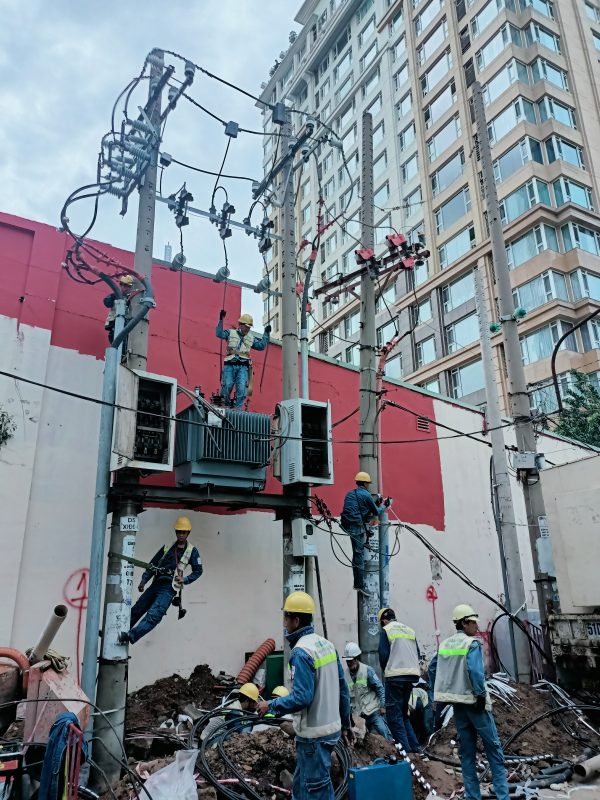
Related Posts
Tay Ninh Solar Power Planning: Technical Framework, Grid Interconnection, and Rollout Roadmap
Technical overview of solar planning in Tay Ninh: irradiation, grid capacity, permitting, design, operations, and [...]
Dec
Binh Duong Solar Planning: Regulatory Framework, Grid Interconnection, and an Implementation Roadmap for Factories and Industrial Parks
An overview of Binh Duong solar planning: legal framework, interconnection, design, risk management, and an [...]
Dec
Solar Farm Repair: O&M Workflow, IV Curve Diagnostics, Thermography, Inverter Service and Utility-Scale Safety
A utility-scale solar farm repair plan centered on O&M, IV curves, thermal imaging, inverter service, [...]
Dec
Dong Nai Solar Power Plan 2023–2025: Tri An 1,029 MW, Grid Upgrades and the DPPA Pathway
A complete look at Dong Nai’s solar power plan: Tri An 1,029 MW, irradiation potential, [...]
Nov
Quang Ngai Solar Power Plan 2024–2030: Legal Framework, Irradiance Potential, and Development Roadmap
A complete look at Quang Ngai’s solar power plan: capacity targets, irradiance (PVout), development zones, [...]
Nov
Solar Damage Assessment Services: On-Site Procedures, EL/IV/Thermography Testing & Compliance with Standards
Discover IEC/UL/NEC standard solar damage assessment processes: on-site evaluation, EL and IV curve testing, thermal [...]
Nov
Comprehensive Package Estimate for a 1800MVA 500kV Substation: Scope, Configuration 3x600MVA, Standards and Timeline Management
An overview of the 1800MVA 500kV substation estimate: construction scope, configuration 3x600MVA, GIS/AIS, SCADA, standards, [...]
Nov
Factory Electrical Systems: Comprehensive Design and Implementation Guide
Discover the detailed and safe process of factory electrical systems design and implementation. [...]
Oct
Blueprints Required for Factory Construction Permits
Discover the necessary blueprints in factory construction permit applications, from floor plans to electrical and [...]
Oct
What Are the Requirements for a Factory Construction Permit? A Comprehensive Guide
Explore the documentation and steps needed to secure a factory construction permit for streamlined project [...]
Oct
Factory Construction Permit Procedures in Vietnam: Essential Guidelines and Documents
Learn the procedures for securing a factory construction permit in Vietnam, focusing on document preparation [...]
Oct
Key Steps in the Factory Construction Process
Discover the essential steps and requirements for building factories. [...]
Oct
Comprehensive Electrical Substation Solutions by Quanganhcons
Discover the cutting-edge electrical substation solutions offered by Quanganhcons for industrial applications. [...]
Oct
Investment Costs for a 1MWp Solar Power System and Influencing Factors
Explore the investment costs for a 1MWp solar power system in Vietnam and the influencing [...]
Sep
QuangAnhcons: Elevating Wind Energy Solutions
Explore QuangAnhcons' leadership in wind energy and renewable solutions in Vietnam. [...]
Sep
Electrical Contractor Strategies at Becamex Industrial Park
Discover the strategic advancements and partnerships of the electrical contractor at Becamex Industrial Park. [...]
Sep
Investment Insights for 1MW Wind Energy in Vietnam: Costs and Opportunities
Discover the detailed analysis of costs and opportunities for investing in 1MW wind energy projects [...]
Sep
Advanced Electrical Installation Solutions by QuangAnhcons
Explore advanced electrical installation solutions and modern technology with QuangAnhcons. [...]
Sep
Enhancing Industrial Electrical Services with Quanganhcons
Discover Quanganhcons' expertise in industrial electrical services, offering efficient and sustainable power systems. [...]
Sep
Comprehensive MEP Solutions by QuangAnhcons: From Design to Maintenance Excellence
Discover optimal MEP solutions with QuangAnhcons, dedicated to excellence from design through maintenance. [...]
Sep